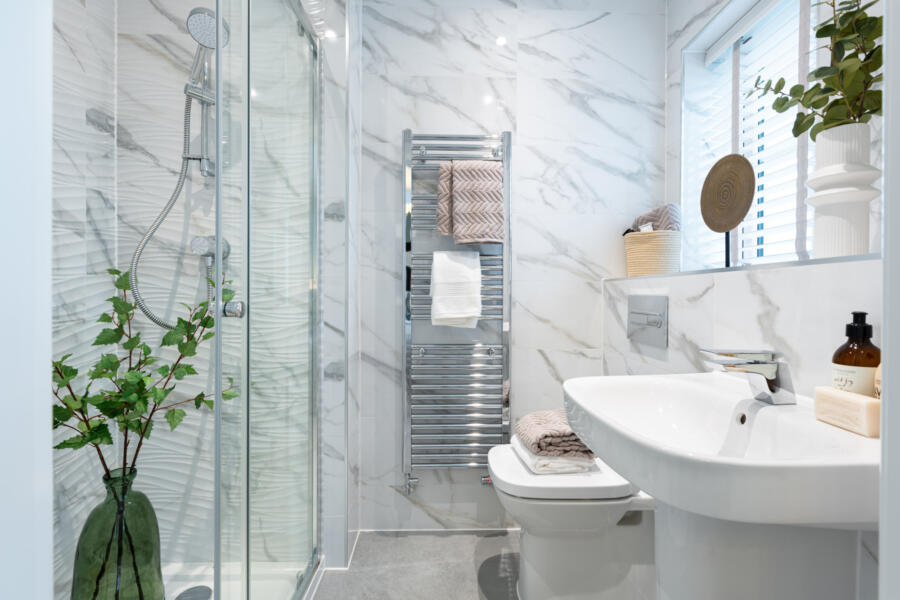
Living a more sustainable lifestyle is a journey, not a destination, and there are small and big changes that we can all make in our homes to help us along the way. Here are eight ways that you can start being more environmentally friendly in your bathroom, from everyday habits to major overhauls.
Add a recycling bin to your bathroom
You have one in your kitchen, so why not your bathroom? Having a dedicated recycling bin in your bathroom is one of the simplest ways to be more sustainable, so you can easily separate your waste – and you’ll be surprised at how quickly it starts to fill up with everything from cardboard toilet paper tubes to plastic shampoo bottles.
The Big Plastic Count, a 2022 study conducted by Greenpeace and Everyday Plastic, found that around 1 in every 10 pieces of plastic thrown away by UK households falls under the ‘toiletries and cleaning products category’; when you consider that almost 100 billion pieces of plastic packaging are disposed of every year, and only 12% is recycled, that’s an astounding amount of plastic waste being generated from within our bathrooms alone. So if you’re looking for ways to reduce your household’s plastic consumption, your bathroom is always a good place to start.
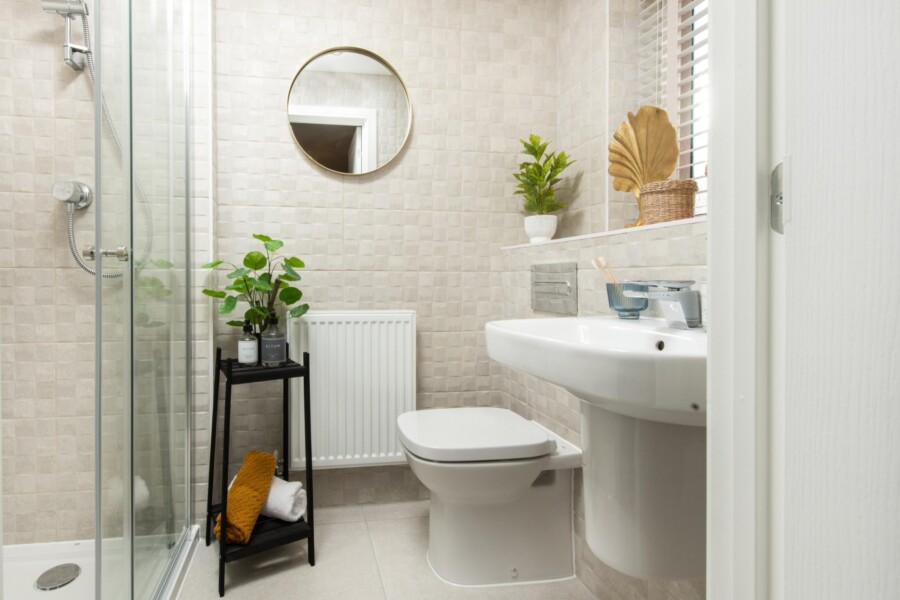
Choose plastic-free packaging (or ditch packaging altogether)
Recycling your plastic packaging is crucial, but an even better habit is to actively look for toiletries and cleaning products with plastic-free packaging. We’re all familiar with soap bars in cardboard boxes or paper bags, but solid shampoo and conditioner bars, dissolvable cleaning product tablets, and even tube-free toothpaste tablets in glass jars are becoming easier than ever to find as more people make the move towards ‘zero-waste’ household items. Solid bars and tablets also take much less water to produce than their liquid counterparts, and they’re lighter and more compact to transport, which lowers their carbon footprint.
If you’re fortunate to have a refill shop in your local area, you can top up your old bottles with eco-friendly shampoo, conditioner, liquid soap, and shower gel. So while it’s not strictly ‘packaging free’, you’re reducing the amount of packaging you consume and making your plastic bottles useful for longer.
Reduce your water usage
We all know that reducing the volume of water we use in our bathrooms is a crucial step towards being more eco-friendly, as well as keeping our water bills as low as possible. Switching off taps when shaving, scrubbing our hands or brushing our teeth, and taking quick showers instead of baths are all good habits we’ve been practising for a long time – in fact, the Energy Saving Trust recommends keeping your showers to just 4 minutes long to save both water and money.
If you’re planning to make upgrades to your bathroom soon, consider installing a low flush toilet, or adding a water-saving shower head or flow restrictor to the shower hose to immediately reduce the amount of water you consume. Or to get serious about sustainability in your bathroom, install a technology-packed smart digital shower – such as those available from leading UK brand and Bellway partner, Mira Showers - with features such as remote voice and app control, customisable temperature and flow presets, and water usage tracking so you can monitor and optimise your showering habits.
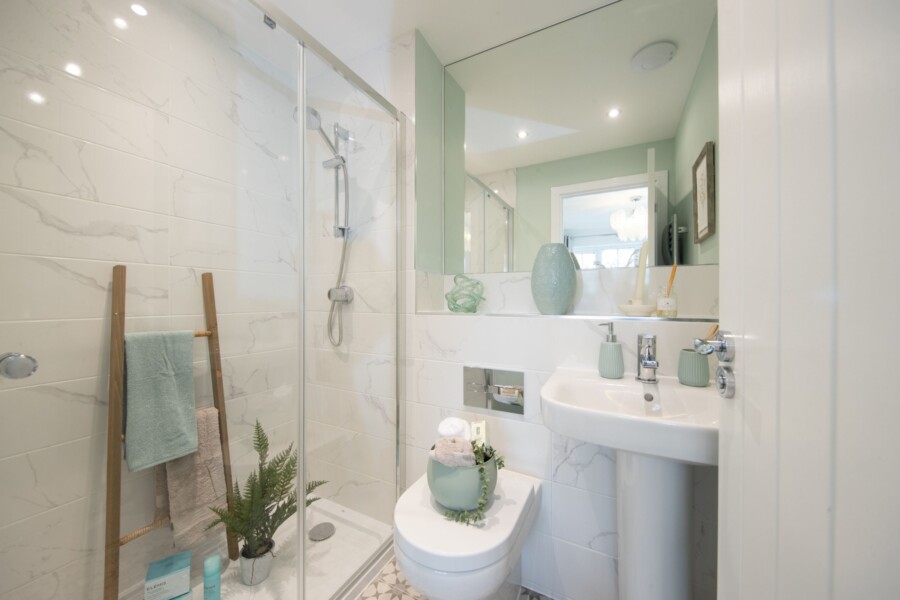
Reuse, repurpose and upcycle
Often the smallest room in the house, bathrooms need savvy storage which presents some exciting opportunities for upcycling.
A vintage dresser can be repurposed into a vanity unit surrounding a sink, old fruit crates can be stacked on the floor or screwed to the wall to store extra towels and toiletries, and wooden ladders leaning against the wall can be used for hanging towels or displaying small trinkets and potted plants.
If you’re undertaking a full renovation project, check in your local area to find out whether your old bathroom suite can be recycled. If it’s in good condition you could sell or donate your bathroom suite, either whole or in parts, to give it a second life.
Switch to recycled toilet paper
We all use it, so why shouldn’t we make a better choice about what we use? Changing your usual toilet paper to one made with recycled materials is an effortless switch, especially if you opt for a toilet paper subscription which will have your supplies delivered to your door, in plastic-free packaging, on a regular schedule.
Bamboo toilet paper is also a sustainable option, as it’s made from a renewable and incredibly fast-growing crop that requires very little water and no fertiliser.
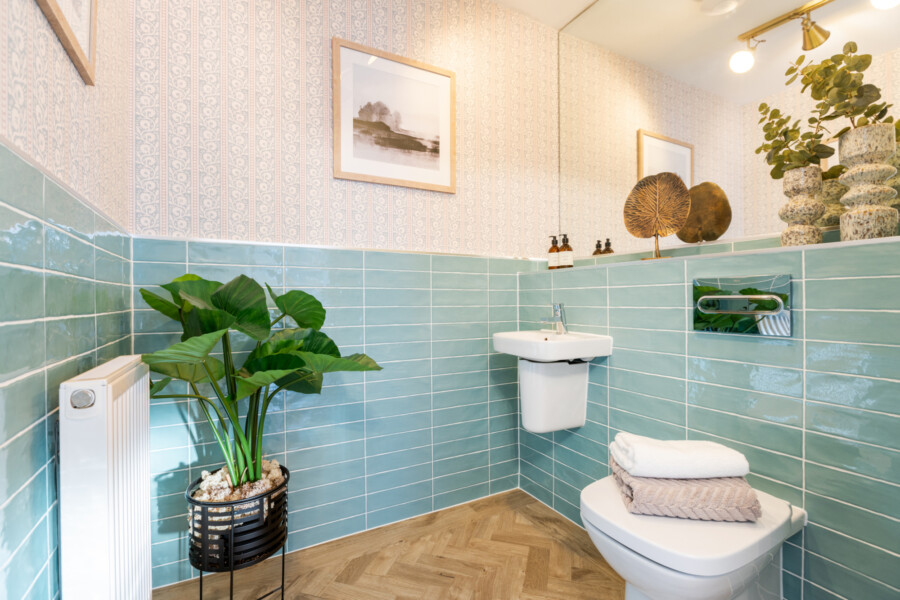
Wash your towels less
Could you be washing your towels too frequently? If you’re washing your towels every day, then the answer might be yes – experts say that towels should be washed after three uses, as dead skin cells and bacteria can quickly accumulate on the fabric.
Washing towels and other large garments can use lots of water and energy, so it’s a good habit to only wash them when necessary as part of a more sustainable household routine.
Cut your use of disposables
While they might be convenient and cheap, disposable toiletries like razors and single-use makeup wipes have a very real cost to the environment. Millions of these disposable products are sent to landfill every year, which is not only a staggering volume of waste, but also terrible news for the environment as the plastic within these products will gradually break down and leech microplastics into soil and waterways for decades to come.
While there are plastic-free and biodegradable alternatives to many disposable toiletries, eliminating your use of them altogether is an overall more earth-positive option. Reusable and washable cloth face wipes and makeup remover pads, and menstrual products such as pads, cups and underwear are easier to find than ever, with major supermarkets now stocking these options alongside their disposable counterparts. While reusable toiletries can be more expensive to buy, they don’t need to be replaced for much longer, which makes them an investment that’s worth making for yourself and the world you live in.
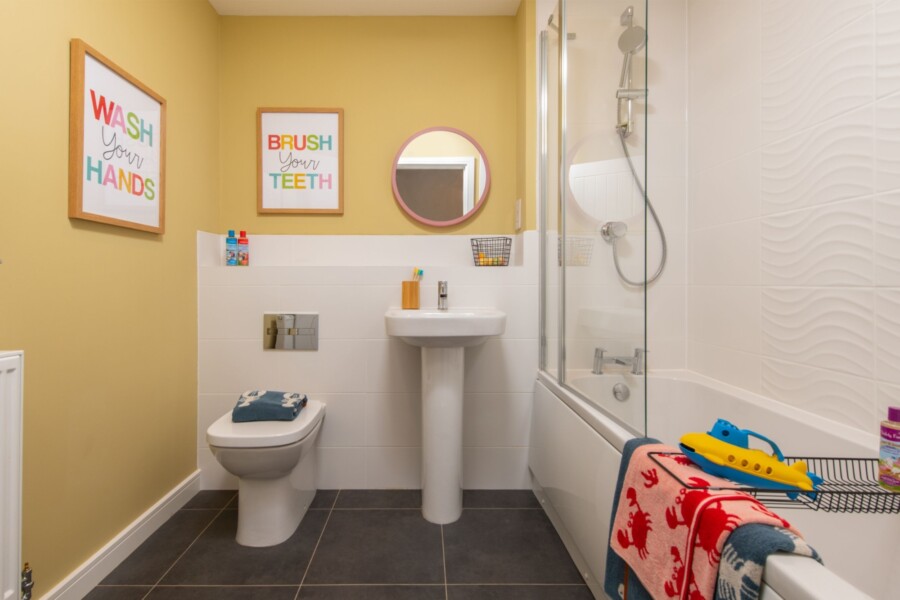
Choose eco-friendly bath toys for your kids
Make a splash at bathtime with kids’ toys that are made from natural rubber, or recycled plastic. Eco-friendly children’s bath toys are another way of keeping new plastic products out of your bathroom without compromising on any of the fun.
Make sure to allow your bath toys to dry properly after each use in a bath net, and clean and sanitise them regularly to prevent mould from forming and prolong the life of the toys. Bath toys that squeak, or squirt water are particularly prone to mould growth inside as they can’t be dried or cleaned properly, so plug up the holes with glue before their first use.
If you’re thinking of making your next home move, discover how an energy-efficient Bellway home could save you thousands of pounds per year on your utility bills, compared to a second-hand home. Built with sustainability in mind, using cutting-edge technologies, materials and building techniques, your new build Bellway home could be the best move you’ll make.
Share
Topics
Lifestyle Bathrooms SustainabilityYou might also like
-

EPC certificates: What are they and how do you get one?
-

100% Mortgages – Your guide to zero deposit mortgages
-

Three tips on designing a kitchen you’ll love for years to come
-

Our Nest: Growing into Georgia and Matt’s nature-inspired Bellway Oakwood home
-

First time buyer myths busted: Why you can buy your first home in 2025




